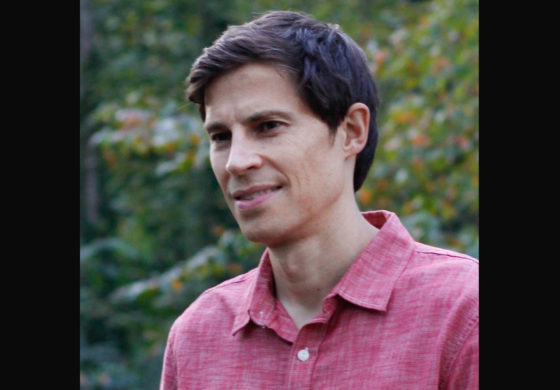By Page H. Gifford
Correspondent
Erik A. Otto’s book “Detonation,” a dystopian novel reflecting society’s worship of technology and chronic innovation is flagged with warning signs in reality. Many authors of this genre have expressed similar concerns, including George Orwell in his classic “1984” or Aldous Huxley’s “Brave New World,” and “Ray Bradbury’s groundbreaking “Fahrenheit 451.” They have an uncanny way of looking into the future with a “what if” attitude they apply to their works of science fiction, making their audiences see things in a different if not frightening way.
“Science fiction evokes a sense of wonder while at the same time allowing readers to wrestle with philosophical or social issues that they wouldn’t otherwise consider. I always loved to extrapolate on a theme or conflict or technology and see where it could take us, and with science fiction, you can do that in a thought-provoking and entertaining way,” said Otto. “Also, the fact that much of what we write about in science fiction could happen gives the narrative a greater gravity compared to other sub-genres of speculative fiction.”
Otto’s education is in biomedical engineering and business. He worked for Johnson & Johnson for twelve years, mostly evaluating new technologies and business partnerships for their diabetes monitoring business. He then managed a small start-up business that was developing a software app ecosystem that alerted people with diabetes to risky blood sugar patterns. He is currently focusing on his writing but also trying to get a small non-profit off the ground called Ethagi that is advocating for the safe and ethical use of advanced artificial intelligence.
It was these scientific fantasy worlds that led Otto to his interest in writing. As a teenager, he was an avid reader of science fiction and fantasy and used to create sophisticated role-playing games in his basement. Even though he only played these games a few times he couldn’t refrain making up new ones.
Some of the sci-fi authors that have shaped his views of the future include Ursula K Le Guin, one of his favorite authors.
“Her work is always thought-provoking and entertaining. She is incredibly efficient with her prose, and she doesn’t overwhelm you with exposition. I loved the “Left Hand of Darkness” and the “Hainish” novels.” He also enjoys the works of Orson Scott Card. “You can tell he is trained as a playwright because the dialogue is so well controlled and each scene is a self-contained experience with a beginning, middle and, end.” He is also a fan of Isaac Asimov, Frank Herbert, and David Brin. “These names are perhaps a bit cliché but there is a reason they are on so many people’s lists; they are masters at creating immersive and thought-provoking science fiction.”
As for writing, that came later in his life. He calls himself a late bloomer and didn’t do much writing in his youth but in the last twelve years, he says it has become a great passion. He has completed five full-length books.
“I have always loved being immersed in other worlds, and I think that is at the root of what inspired me to write.” His novel “Detonation” is a narrative that shows the darker side of innovation between two societies and their struggles with a super intelligent machine. Realizing the chilling consequences leads them into conflict with an inexhaustible enemy. It is reminiscent of Rod Serling’s “Twilight Zone” which often preached about such future occurrences with stunning results.
“I have been interested in AI from a young age, predominantly through science fiction books and films like “A Space Odyssey 2001” and “Artificial Intelligence.” At the time it was a fascinating vanguard to explore in terms of human-machine interactions and the meaning of life. In the last few years my interest has been heightened because we are closing in on that vanguard with the incredible progress we are making in the field,” he said. “I do believe we are approaching the singularity—a point when artificial intelligence surpasses human-level intelligence. When that happens, whatever machine intelligence we create will have more impact on our civilization than any other technological paradigm, and if we don’t set the initial conditions right, it could be very problematic for us as a species.
The idea for “Detonation” came late in 2016 when Otto was looking into the latest developments in machine learning. Hearing descriptions on how advanced AI is and how it could impact us in the long-term concerned him.
“I read books like “Superintelligence” by Nick Bostrom and “Life 2.0” by Max Tegmark, hoping to have my concerns assuaged. These books only amplified my fears. I realized that while there were many books and films about AI, there wasn’t anything that did a good job illustrating how our society is so ill-equipped to understand the existential risks. This was the seed that inspired me to write Detonation.”
He agrees that to an extent his dystopian novel has warning signs for technologically obsessed future generations if they become complacent with potential misuse.
“AI development, in particular, is governed by a Silicon Valley mindset of “fail fast” so you can get better, whereas for advanced AI approaches we should be looking at it like the Manhattan Project, or a trip to Mars. There are lots of ways to fail, and failure should not be an option, because it will be hard to rein in something that is a million times smarter than us once we let it loose.”
Otto will be discussing his work at the next meeting of The Friends of The Library on Sept. 4, at 10 a.m. at the Fluvanna County Public Library. He adds he always welcomes more in-depth discussions about advanced AI and writing. People can get in touch with him via his author website; erik-a-otto.com.





